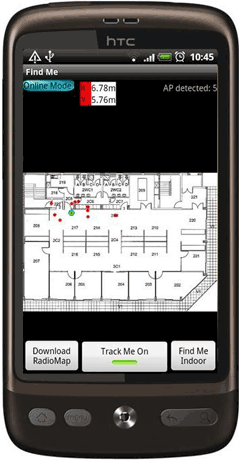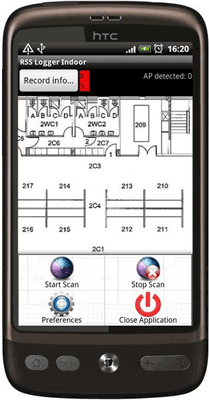by Christos Laoudias, Georgios Larkou, Demetrios Zeinalipour-Yazti and Christos G. Panayiotou
The wide availability of location data is undoubtedly reshaping the entire smartphone ecosystem with the advent of innovative location-aware services and applications. To accelerate their adoption by the public, the Airplace positioning system is a location-enabling platform that aims to deliver highly reliable and accurate location information right where the highest demand is anticipated in the near future: inside buildings.
Location information has become an integral part of the mobile user’s daily life and Google is already reporting that a third of searches on portable electronic devices refer to spatially relevant content, while 94% of smartphone users have searched for local information. This is mainly due to the proliferation of powerful smartphones featuring on-board GPS sensors. According to Tomi Ahonen Consulting, there are already 1.2 billion smartphone devices in use worldwide, and 770 million of these are equipped with GPS. As one might expect, the most successful Location-Based Service (LBS) is vehicle navigation and pedestrian guidance to points of interest in outdoor areas.
There has, however, been a recent increase in interest in location-aware content specific to large indoor environments, such as shopping malls, museums, exhibition centres, conference venues and airports. Statistics by Strategy Analytics indicate that people spend 80-90% of their time inside buildings, while 70% of cellular calls and 80% of data connections originate from indoors. This has triggered an increasing interest in indoor applications, such as in-building navigation, asset tracking, elderly support for Ambient and Assisted Living (AAL) and others. Since GPS has low availability indoors due to the blockage or attenuation of the satellite signals, alternative geolocation solutions are required.
At the University of Cyprus, we appreciate the benefit of indoor LBS and our goal is to facilitate their wide acceptance. Thus, we focus on the provision of GPS-free location data inside buildings by leveraging location-oriented information collected with the smartphone’s built-in sensors, such as WiFi, accelerometer, gyroscope and digital compass. The Airplace indoor positioning system [1] is a collaborative research effort between the KIOS Research Center and the Department of Computer Science at the University of Cyprus that was initiated a few years ago. Airplace is developed on popular Android smartphones and the unknown user location is determined with the use of Received Signal Strength (RSS) data from the surrounding WiFi infrastructure, ie, wireless Access Points (AP).
This approach is very convenient and extremely suitable for indoor applications running on the users’ smartphones. Firstly, the existing WiFi APs, already deployed in indoor environments for wireless connectivity, are exploited thus avoiding the installation of costly dedicated positioning equipment, such as custom transmitters and antennas. Secondly, we rely on RSS data extracted through passive scanning of the WiFi beacon packets transmitted by neighbouring APs as part of the standard network functionality. Thus, commercial mobile devices, which are usually equipped with WiFi adapters, can be used without any hardware modifications and only a software agent is needed for monitoring the RSS values.


Airplace is based on the RSS fingerprinting approach to address the challenging indoor signal propagation conditions. A number of RSS fingerprints (ie, vectors of RSS measurements recorded from APs in the vicinity of the user) are collected a priori to build the “radiomap”. Location is then estimated by finding the best match between the observed fingerprint and fingerprints in the radiomap using state-of-the-art algorithms developed in-house [2]. The prototype system follows a mobile-based network-assisted architecture in order to reduce the communication overhead, while at the same time addresses security concerns and respects user privacy [3]. In a typical positioning scenario, when a user enters an indoor environment, covered by several WLAN APs, the user’s smartphone obtains the RSS radiomap from the local distribution server in a single communication round and is thereafter able to self-locate independently using only local knowledge and, more importantly, without revealing its personal state.
The Airplace system won the Best Demo award at the 13th IEEE International Conference on Mobile Data Management (MDM'12) and the results of our research are also being exploited for the development of an enhanced prototype system via a technology transfer agreement with a large hardware and software company in Taiwan. In particular, we recently built and demonstrated a hybrid positioning solution that fuses the WiFi location with multi-sensory inertial data that are widely available on Android smartphones to deliver fine-grain location information. Releasing a "big-data" Web2.0-oriented geolocation service that will be scalable to large indoor environments is another direction of this research. In this context, some of our future activities include the investigation of algorithms for reliable floor determination in multi-storey buildings, supporting diverse mobile devices without compromising the positioning accuracy, developing an efficient map-matching component and building a user-friendly indoor navigation application using Google Maps.
Links:
http://www2.ucy.ac.cy/~laoudias/pages/platform.html
http://www.kios.ucy.ac.cy/
http://dmsl.cs.ucy.ac.cy/
References:
[1] C. Laoudias et al: “The Airplace Indoor Positioning Platform for Android Smartphones”, in proc. IEEE MDM’12
[2] C. Laoudias et al: “Localization using radial basis function networks and signal strength fingerprints in WLAN,” in proc. IEEE GLOBECOM, 2009
[3] G. Chatzimiloudis et al: “Crowdsourcing with Smartphones”, IEEE Internet Computing, Volume 16, 2012.
Please contact:
Christos G. Panayiotou
KIOS Research Center for Intelligent Systems and Networks
University of Cyprus
Tel: +357 22 892298
E-mail:
Demetrios Zeinalipour-Yazti
Data Management Systems Laboratory (DMSL), Department of Computer Science, University of Cyprus
Tel: +357 22 892755
E-mail:











